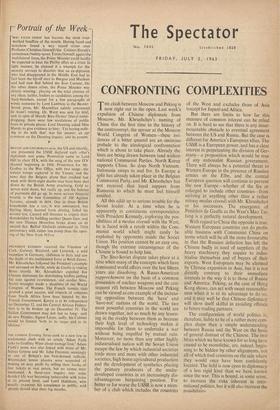CONFRONTING COMPLEXITIES
THE clash between Moscow and Peking is now right out in the open. Last week's expulsion of Chinese diplomats from Moscow, Mr. Khrushchev's naming of China (for the first time in the history of the controversy), the uproar at the Moscow World Congress of Women—these evi- dences of a bitter quarrel are an ominous prelude to the ideological confrontation which is about to take place. Already the lines are being drawn between (and within) national Communist Parties. North Korea supports China. So does North Vietnam. Indonesia sways to and fro. In Europe a split has already taken place in the Belgian Communist Party, and Mr. Khrushchev has not received that loyal support from Rumania to which he must feel himself entitled.
All this adds up to serious trouble for the Soviet leader. At a time when he is apparently in continuous correspondence with President Kennedy, exploring the pos- sibilities of a modus vivendi with the West, he is faced With a revolt within the Com- munist world which might easily be exploited by opponents inside the Soviet Union. His position cannot be an easy one, though the extreme intransigence of the Chinese is bound to help him.
The Sino-Soviet dispute takes place at a time when many of the concepts which have dominated' world affairs over the last fifteen years are dissolving. A Russo-American rapprochement on the basis of a common possession of nuclear weapons and the con- sequent rift between Moscow and Peking can be viewed as one example of the increas- ing opposition between the 'have' and 'have-not' nations of the world. The two most powerful countries in the world are drawn together,' not so much by any lessen- ing in the rivalry between them as because their high level of technology makes it impossible for them to undertake a war without being engulfed by mutual ruin. Moreover, no more than any other highly industrialised nation will the Soviet Union escape the law by which industrial societies trade more and more with other industrial societies, high home agricultural production and the development of synthetics placing the primary producers of the under- developed countries in an increasingly dis- advantageous bargaining position. For better or for worse the USSR is now a mem- ber of a club which includes the countries of the West and excludes those of Asia (except for Japan) and Africa.
But there are limits to how far this measure of common interest can be relied on. It is hard to see that there is any insur- mountable obstacle to eventual agreement between the US and Russia. But the case is different for America's European allies. The USSR is a European power, and has a clear interest in perpetuating the division of Ger- many—a proposition which would be true of any nationalist Russian government. There will always be a potential threat to Western Europe in the presence of Russian armies on the Elbe, and the central European question will continue to prevent the new Europe—whether of the Six or enlarged to include other countries—from arriving at anything other than a rather uneasy modus vivendi with Mr. Khrushcheii or his successors. The emergence of President de Gaulle as the West's Mao Tse- tung is a perfectly natural development.
With regard to China the opposite is true. Western European countries can do profit- able business with Communist China on terms which will be all the more favourable in that the Russian defection has left the Chinese badly in need of suppliers of the heavy machinery they require to indus- trialise themselves and of buyers of their exports. West Europeans may be alarmed by Chinese expansion in Asia, but it is not directly contrary to their immediate interests in the way it is to those of Russia and America. Peking, as the case of Hong Kong shows, can act with sweet reasonable- ness when it is to its advantage to do so, and it may well be that Chinese diplomacy will show itself skilful in avoiding offence to future trading partners.
The configuration of world politics is, therefore, liable to be of a rather more com- plex shape than a simple understanding between Russia and the West on the basis of general distrust of the Chinese. The two blocs which we have known for so long have ceased to be monolithic, are, indeed, begin- ning to be hidden by other alignments, not all of which find countries on the side where they would once have been confidently located. The field is now open to diplomacy of a less rigid kind than we have known since the war. This is bound, in some sense. to increase the risks inherent in inter- national politics, but it will also increase the possibilities






































 Previous page
Previous page